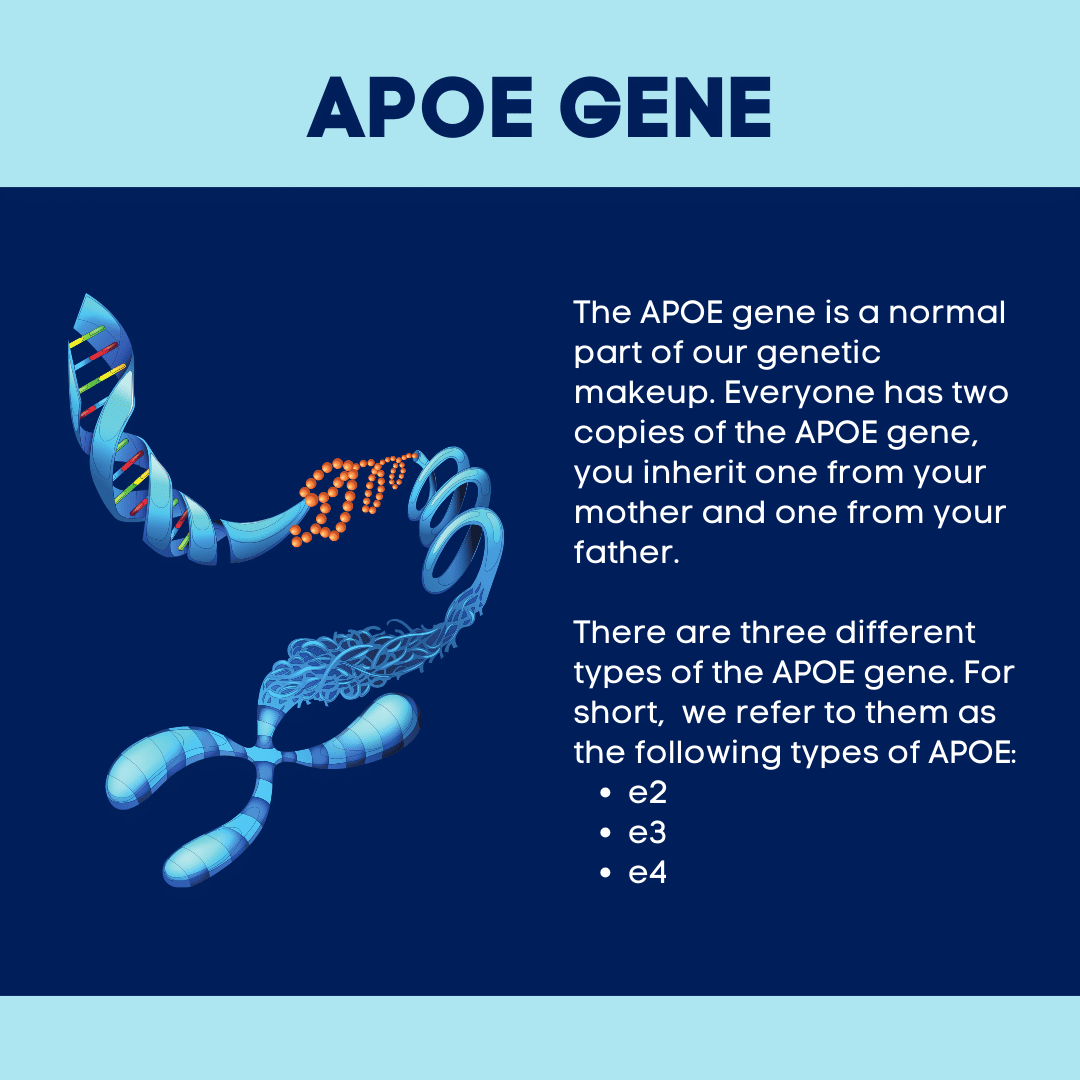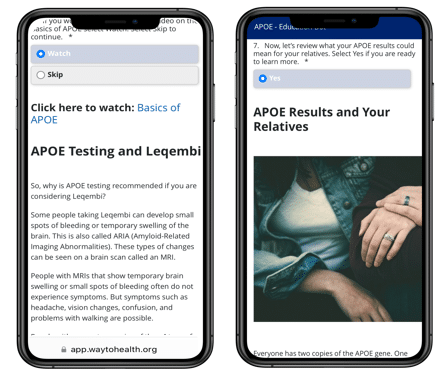Beth Wood Discusses the Evolution of Genetic Counseling Through Telehealth and Chatbots at AAIC 2024
By Meghan McCarthy
Author’s Note: This article is part of ongoing coverage of the 2024 Alzheimer’s Association International Conference (AAIC). To view all highlights, please click here.
Elisabeth Wood, MS, LCGC, has been a genetic counselor at Penn Medicine since 2003. Originally working for the Center for Neurodegenerative Disease Research (CNDR), she spent over a decade focusing on genetic forms of dementias and related disorders. Currently, she works in the Penn Telegenetics Program, where she helps to conduct research on genetic counseling services via telehealth in both clinical and research settings.
Wood sat down with Penn Memory Center (PMC) Staff Writer Meghan McCarthy to discuss her latest work using chatbots as an informational resource for individuals interested in or already receiving genetic counseling. She also presented her work at this year’s AAIC in Philadelphia.
To start off, can you give a brief explanation of the APOE gene, and why a doctor might order genetic testing for it?
The APOE gene is a normal part of our genetic makeup. Everyone has two copies of the APOE gene, you inherit one from your mother and one from your father. There are three different types of the APOE gene, and for short we refer to them as the e2, e3, and e4 types of APOE. Research has firmly established that the e4 type of APOE is a risk factor for Alzheimer’s disease but does not predict who will develop symptoms of Alzheimer’s disease.
A doctor might order genetic testing to find out what type of APOE a patient has prior to considering the use of certain medications called anti-amyloid therapies. These medications are only approved for patients with mild, or early-stage cognitive changes due to Alzheimer’s disease. In addition to being a risk factor for developing Alzheimer’s disease, the e4 type of APOE can also increase the risk for certain side effects associated with anti-amyloid therapy medications. This information can help a doctor and patient discuss the possible risks and benefits of taking these medications.
Can you contextualize your work? What led you to creating telehealth resources for genetic counseling participants?
Our group at Penn has been involved in research looking at ways to return APOE genetic results to research participants for a number of years. One of the primary studies was through a clinical trial called the Generation Study, where we provided APOE genetic results to cognitively unaffected individuals who are considering enrolling in a clinical trial for an Alzheimer’s prevention medication.
In this trial, we completed more than 2,600 genetic counseling sessions using telephone and video to connect with the participants. We knew that once APOE testing became needed for clinical reasons, not just research, we would need additional options for how to get educational and counseling support to patients undergoing APOE genetic testing.
We were able to leverage our prior research experience into developing educational tools for patients with early signs of Alzheimer’s disease or mild cognitive impairment to help teach them about the APOE gene and why genetic testing was being recommended by their doctor, as well as giving them information about what this result might mean to them and their family members. It is about opening a conversation to make sure that patients and their family members have an accurate way of accessing information about the APOE gene as well as opening up about questions for any additional genetic counseling support.
What were your specific project goals?
Going into this project, we really wanted to address the genetic counseling needs in the Alzheimer’s clinic. It would take a large genetic counseling staff to support one-on-one sessions with every single patient that needs APOE genetic testing. Currently, this need is specific for patients who are being considered for possible treatment with Leqembi or lecanemab. As part of their clinical workup for consideration of an anti-amyloid therapy, their doctor has ordered APOE genetic testing. Our aim is not to replace genetic counseling, but to instead provide another way supporting genetic counseling needs.
Our goals were to explore a particular technology, in this case chatbots, that could provide immediate access to information about APOE. We wanted to take all the same information that we would cover in a standard genetic counseling session and make that information available through a chatbot that can be sent out to any patient that is receiving APOE genetic testing via a text message to a smartphone. Either the patient or their caregiver can use this link to access a patient-friendly explanation of the basic facts about the APOE gene and the implications of their test results.
Can you describe the chatbot? How did your team go about designing it?
The chatbot was informed by the existing research and clinical experiences in genetic counseling for neurodegenerative conditions. In terms of genetic testing, it is important to recognize both the medical and family significance of a result, as genetics are shared among family members. We drew upon a rich background of research, previous patient experiences, and genetic counseling knowledge to shape the information provided in the chatbot.What information does the chatbot offer to users?
For this initial pilot stage, it’s largely educational. It provides information about the APOE gene, including why a doctor might recommend testing and potential implications for anti-amyloid therapy. It also covers inheritance and what the information might mean for the patient and their family members.
We got feedback that some patients didn’t know that genetic counseling was an available form of support.
We also heard that by learning more about the APOE gene, some patients were interested in discussing next steps for sharing this information with their adult children because they understood the genetic significance of the APOE gene.
How do people access this chatbot? Are they texted a link that brings them to the platform?
Yes. It’s important to note that we developed this chat in partnership with Way to Health here at Penn Medicine. We relied on their expertise and they were wonderful to work with.
A text message is sent inviting the recipient to the APOE educational chat. If they are interested, they can respond to the chat to get a link that connects them to the information about APOE. This setup minimizes the need for extensive texting. Additionally, there is an option to request assistance from a genetic counselor.
I’m curious, especially with older adults, where there can also be kind of a digital divide going on in terms of accessibility. How were the chatbots tailored to this demographic?
We conducted a pilot study, sending the chatbot to more than 200 patients and caregivers, followed by a survey to gather feedback on user-friendliness and preferences.
We are using this feedback to make the chat better, addressing any issues and focusing on elements that users appreciate. While we are creating this chat tool to help get educational information out, I think that a critical feature is the option to request assistance through a quick text message.
What have been common feedback themes amongst users?
We were able to complete exit interviews with 20 Penn participants and caregivers. Some common positive feedback we heard was that they found the chat to be informative, relevant, and helpful. Some noted the information was fascinating, in particular learning about the genetic aspect of APOE information. Many participants noted that it helped them to understand inheritance and the different type of test results, and it facilitated conversations with relatives about genetic information.
What are your future visions and hopes for this work?
We hope to incorporate user feedback to improve the chatbot and integrate it more smoothly into a clinical care process. As individuals undergo a diagnostic workup, this tool can provide crucial support during an overwhelming time, not only for the patient but also for their family. The goal is to answer immediate questions, provide clarity, and potentially connect patients or their family members with a genetic counselor for personalized information on genetic risk factors for Alzheimer’s disease. Ultimately, our aim is to offer the highest level of patient care, recognizing that genetic information impacts the entire family.


